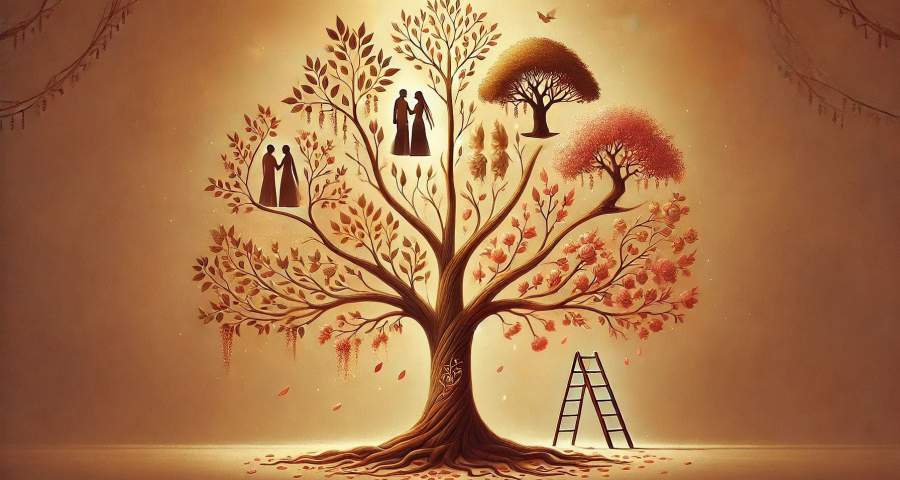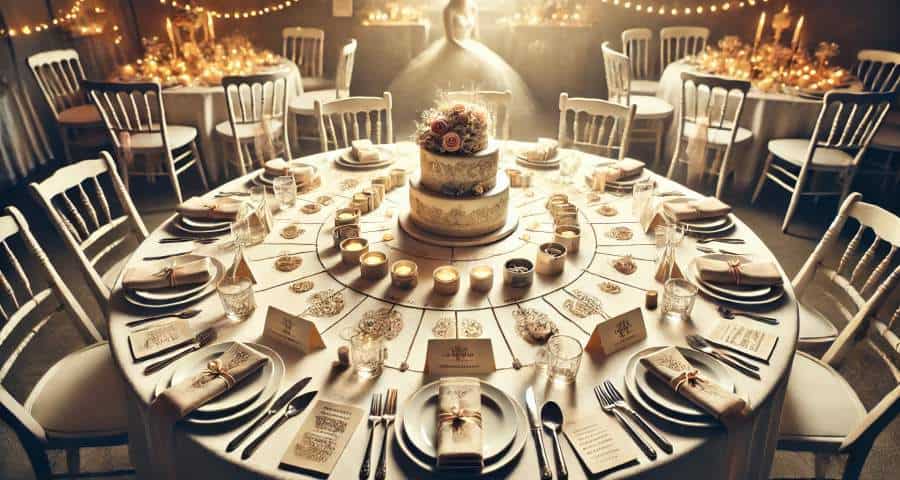Your wedding day is one of the most important events of your life, and having the right people by your side can make all the difference.
These chosen few will be your main support system, both during the wedding planning process and on your big day.
Choosing your wedding party involves more than just selecting your closest friends or family, it requires careful thought about who will best support you, celebrate with you, and help make your wedding unforgettable.
Envisioning Your Ideal Wedding Party

Begin by defining the atmosphere and style of your wedding. Are you going for a formal, traditional event, or a more relaxed, casual celebration? Your vision will help dictate the size and roles of your wedding party.
- Intimate Affairs: A smaller wedding party creates a personal atmosphere and suits smaller venues or destination weddings well. Typically, this includes 1-3 attendants on each side.
- Traditional Approach: A medium-sized wedding party with 4-5 attendants on each side offers a balance, supporting you adequately without overwhelming the setting.
- Grand Celebrations: For a larger spectacle, consider a wedding party with 6 or more attendants on each side. This allows you to involve more loved ones but requires thorough coordination.
Additionally, think about the specific roles you need to fill, such as maid of honour, best man, bridesmaids, groomsmen, flower girls, and ring bearers. This helps in deciding who you would like to fulfil these roles, based on their ability to support and contribute to your wedding day.
Maybe you want something non-traditional, for example you might choose to have a mixed-gender wedding party, opt for a “man of honour” or “best woman,” or create unique roles that reflect your personal style and relationships.
Key Factors to Consider

When choosing the wedding party, our primary focus is on selecting the maid of honour, bridesmaids, best man, and groomsmen. This emphasis is due to the significant responsibilities these roles entail before, during, and after the wedding. These key members not only support logistical operations and emotional needs but also play pivotal roles in facilitating and orchestrating the day’s events.
Other roles such as flower girls and ring bearers are primarily ceremonial. Their contributions, while visually and emotionally significant, are confined mostly to the ceremony itself and do not extend into the planning or execution phases of the wedding.
Key factors to consider when choosing these core members:
- Reliable and Responsible: Choose individuals who not only show up on time but also proactively manage their duties and take ownership of their roles in the wedding.
- Supportiveness: Choose people who are genuinely excited about your wedding and willing to offer emotional support throughout the process. This support is essential for maintaining a positive atmosphere, especially during stressful times.
- Availability: Consider their ability to commit time to pre-wedding events, planning sessions, and the wedding itself. It’s crucial for ensuring that key activities and preparations are attended to without last-minute hassles.
- Willingness and Excitement: Ensure potential wedding party members are not only able but also eager to participate. Their enthusiasm can drive their involvement and positively influence the wedding’s atmosphere. This is fundamental as it ensures that everyone involved is committed and happy to be part of your journey.
- Problem-Solving Skills: Look for those who can think on their feet and handle unexpected situations calmly. This trait is particularly important for leaders like the maid of honour or best man, who often need to address issues as they arise.
- Compatibility: Consider how well potential wedding party members might work together as a team. Compatibility in terms of personality and the ability to collaborate under stress is key.
- Understanding of Responsibilities: Ensure they comprehend and are willing to take on the duties involved. It’s important to communicate these responsibilities clearly to avoid any misunderstandings.
- Long-Term Relationship: Choose individuals you see remaining in your life well beyond the wedding day. This adds deeper value to their presence at your wedding.
- Balance: Aim for a mix of personalities and skills that complement each other and you as a couple. This balance helps manage different aspects of the wedding effectively, from the emotional to the practical.
Maid of Honor
The maid of honour typically takes on some of the most substantial responsibilities in wedding planning and execution. Here are a few additional traits to consider specifically for this role:
- Emotional Anchor: Your Maid of Honour should be more than just a planner; she should be a supportive confidante. Choose someone who not only rejoices in your happiness but can also offer comfort during stressful times. She should handle sensitive situations with empathy and celebrate every victory with you on the journey to your big day.
- Organisationally Skilled: With many moving parts in a wedding, from coordinating vendors to tracking small details, a Maid of Honour with strong organisational skills is crucial. She should efficiently manage tasks, keep everything on track, and ensure that nothing is overlooked, helping transform a potentially chaotic experience into a seamless one.
- Good Communication: Effective communication is essential. Your Maid of Honour should grasp your vision and expectations and convey them to others clearly. Often acting as a liaison between you, the bridal party, and sometimes family members, her diplomatic communication ensures that your wishes are understood and respected by everyone.
- Ability to Take Initiative: While it’s important for your Maid of Honour to follow your lead, having someone who can take initiative is invaluable. She should make informed decisions when you’re not available and know when to step in and help out, effectively managing unforeseen issues with a proactive approach.
- Gets Along with Your Friends and Family: It’s beneficial for your Maid of Honour to have a good rapport with your other friends and family members. Given her close interactions with them throughout the planning process and on your wedding day, her sociable and personable nature can foster a joyful and cooperative atmosphere among everyone involved
Best Man
The best man similarly carries significant responsibilities, particularly close to the groom. Here are additional considerations for selecting a best man:
- Organisational Skills and Attention to Detail: A Best Man must be adept at managing schedules, coordinating with various people, and keeping track of multiple tasks simultaneously. His ability to juggle different elements and pay attention to the minutiae can significantly affect the smooth running of wedding activities.
- Public Speaking Ability: The Best Man is often expected to deliver a speech at the reception. This moment can be a highlight, requiring the ability to convey heartfelt sentiments, share memorable stories, and celebrate the couple’s future. Public speaking skills are indispensable for engaging the audience and expressing thoughts clearly and eloquently.
- Close Relationship with the Groom: The emotional support a Best Man offers is crucial. He should be someone who knows the groom well and understands his needs and emotions. This close relationship allows for personalised support and ensures that the Best Man’s speech and actions are genuinely invested in the groom’s happiness.
- Adaptability and Problem-Solving Skills: The Best Man should be capable of adapting to changes and solving problems that arise unexpectedly. This flexibility ensures that any issues can be handled discreetly and efficiently without impacting the celebration.
- Emotional Intelligence: It is essential for the Best Man to have high emotional intelligence to effectively support the groom and manage interactions with family and friends during emotionally charged moments.
- Rapport with the Wedding Party: Having a good rapport with other members of the wedding party is vital. This enables the Best Man to coordinate activities smoothly and foster a spirit of cooperation and enjoyment among all participants.
Who to Consider

Selecting your wedding party is a deeply personal decision that should reflect your closest relationships and complement your wedding’s vision. While it’s important to consider the feelings and expectations of loved ones, always prioritise your and your partner’s preferences to ensure the day feels authentic to you both.
- Your Closest Friends: Close friends often know you inside and out, making them ideal candidates for your wedding party. They understand how to handle your stress and can play a crucial role in managing the emotional dynamics of your wedding day. However, be mindful that their close relationship might sometimes cloud judgement or lead to conflicts if they have strong opinions about your wedding decisions.
- Family Members: Including siblings or cousins can add a traditional and sentimental element to your wedding. These roles can strengthen family bonds and honour your shared history. It’s vital to carefully consider family dynamics, as underlying rivalries or sensitivities could impact the role they play. Ensure they are genuinely up for the task to avoid any unnecessary tension.
- Long-Time Acquaintances: Old friends bring a sense of reliability and history to your wedding party. They’ve been through various life stages with you and understand your evolution as a person. As people grow and change, ensure that their current relationship with you aligns with your needs and that they remain adaptable to your evolving preferences.
- Work Colleagues: Work friends often see a side of you that others don’t. If you spend a significant part of your day with these individuals, their presence at your wedding can add another layer of personalization. It’s also important to maintain professional boundaries; include work friends who are genuinely close to you, not just those you see every day.
When choosing, consider not only the emotional bond but also their ability to handle the responsibilities of their role effectively and objectively. This includes their willingness to participate joyfully, their ability to manage tasks, and how well they mesh with the rest of the wedding party.
Balancing Different Types of Relationships

There’s no one-size-fits-all approach to selecting your wedding party. The key is to create a group that feels right for you and your partner, represents the important relationships in your lives, and will support you throughout the wedding planning process and on your big day.
- Friends vs. Family: One of the most common dilemmas couples face is deciding between friends and family members for their wedding party. Friends often understand your current lifestyle and preferences better, and may be more in tune with your vision for the wedding. On the other hand, including siblings or close cousins can add a traditional touch and strengthen family bonds. Consider a mix of both, perhaps choosing a sibling as your maid of honour or best man, while close friends serve as bridesmaids or groomsmen.
- Childhood Friends vs. Current Friends: You may feel torn between friends you’ve known since childhood and those who are central to your life now. Childhood friends represent your history and have been imagined at your wedding for years, but they might not be as involved in your current life. Current friends might better understand your present-day self and lifestyle.
- Your Friends vs. Your Partner’s Friends: Ensuring both you and your partner feel represented in the wedding party is crucial. Your friends will likely understand your needs and preferences better, while including your partner’s friends can show unity and help integrate your social circles.
- Single Friends vs. Coupled Friends: The relationship status of your wedding party members can affect dynamics and planning. Single friends may have more time to dedicate to wedding tasks but might feel awkward at couple-centric events. Coupled friends can relate to your relationship journey but may have more commitments.
- Local vs. Long-Distance Relationships: Geography can play a significant role in how involved your wedding party members can be. Local friends can be more hands-on with planning and attending pre-wedding events. In contrast, a close long-distance friend might not be able to contribute in the same way and have limited interaction before the wedding day.
- Work Relationships: Including colleagues can be tricky but rewarding if you have close friendships at work. They understand a significant part of your daily life and can add a professional touch to planning. However, it may also blur professional and personal boundaries.
Handling Sensitive Situations

Choosing your wedding party often comes with its share of delicate social negotiations. It’s essential to handle these situations with care to maintain relationships and keep your wedding day focused on celebration rather than conflict.
- Reciprocity and Expectations: One of the subtler yet challenging aspects of planning your wedding involves navigating the expectations of reciprocity. This often arises when someone expects to be in your wedding party because they included you in theirs or because of long standing friendships or family expectations. Here’s how you can handle such expectations sensitively:
- Set Clear Expectations Early: Early in your engagement, begin discussions about your vision for the wedding, including the size and scope of your wedding party. This helps set a precedent before any assumptions are made and provides a clear rationale for your decisions.
- Communicate Transparently and Compassionately: If someone expects to be part of your wedding party but isn’t included, address it directly and with sensitivity. Explain your reasons, focusing on your current needs and wedding vision rather than shortcomings in your relationship. Emphasise the importance of their presence at your wedding, even if it’s not in the capacity they expected.
- Offer Meaningful Alternatives: As with handling other sensitive situations, offering alternative roles can play a significant role:
- Ceremony Readers: Invite them to read a meaningful piece during your ceremony.
- Guest Book Attendants: Ask them to manage the guestbook, welcoming guests and guiding them at the reception.
- Toast Givers: Allow them to deliver a toast, sharing their special memories and well-wishes.
- Ushers or Candle Lighters: These roles are perfect for those who should be acknowledged but may not be suited for groomsmen or bridesmaids.
- Honor Attendants: Recognize their significance with a title that respects their role in your life without the full responsibilities of a bridesmaid or groomsman.
- Maintain Open Lines of Communication: Keep the conversation open. Allow them to express their feelings and concerns, and listen actively. This shows that you value their feelings and relationship, helping to maintain your bond despite potential disappointments.
- Be Firm but Kind: While it’s important to be kind and understanding, also be firm in your decisions. Your wedding day is about you and your partner, and your choices should reflect what makes you both happiest.
Making the Final Decision

Making the final decision on your wedding party involves a delicate balance of emotional connection, practical considerations, and mutual respect and excitement for the role. By taking the time to evaluate each potential member’s fit thoroughly, you ensure that your wedding day is supported by individuals who truly add value and happiness to one of the most important days of your life.
- Emotional Connection and Support: The people you choose should be more than just participants, they should be your pillars of support. Consider how these individuals have supported you in the past. Reflect on your interactions and the emotional support they’ve provided. Ask yourself, “Who brings out the best in me, especially under pressure?” and “Who is consistently there for me when I need them?”
- Current Role in Your Life: Assess how involved potential candidates are in your life right now. It’s crucial to choose individuals who are not only significant in your history but also deeply connected to your current circumstances. This ensures they understand your needs and are genuinely excited and prepared to support you through the wedding planning process and the event itself.
- Responsibilities and Expectations: Have open discussions with potential wedding party members about what the role entails. It’s important that they understand the responsibilities, time commitment, and the level of involvement expected. Ensure they feel comfortable and enthusiastic about taking on these duties.
- Logistics, Proximity, and Availability: Consider practical aspects such as proximity and availability. If your ideal maid of honour or best man lives far away, think about how this will affect their ability to participate actively in pre-wedding activities and be present for crucial preparations. Logistics play a significant role in how well they can perform their duties.
- Life Circumstances: Evaluate whether their current work pressures, personal commitments, or other responsibilities might impact their ability to fulfil their role effectively. This consideration is crucial to avoid placing undue stress on them and ensuring they can dedicate the necessary attention to the role.
- Choosing with Your Heart and Head: This decision is as much about the heart as it is about logistics. Trust your instincts about who will make your day better, not just smoother. The best choice for any role in your wedding party is someone who brings reliability, joy, and peace of mind to your wedding experience.
- Communication and Decision-Making: Be confident in your choice, knowing that the right individuals will enhance both the joy and the smooth running of your wedding day. When you’ve made your decision, communicate it clearly and kindly. For those not selected for the primary roles, consider offering alternative roles that still allow them to be a significant part of your celebration.

